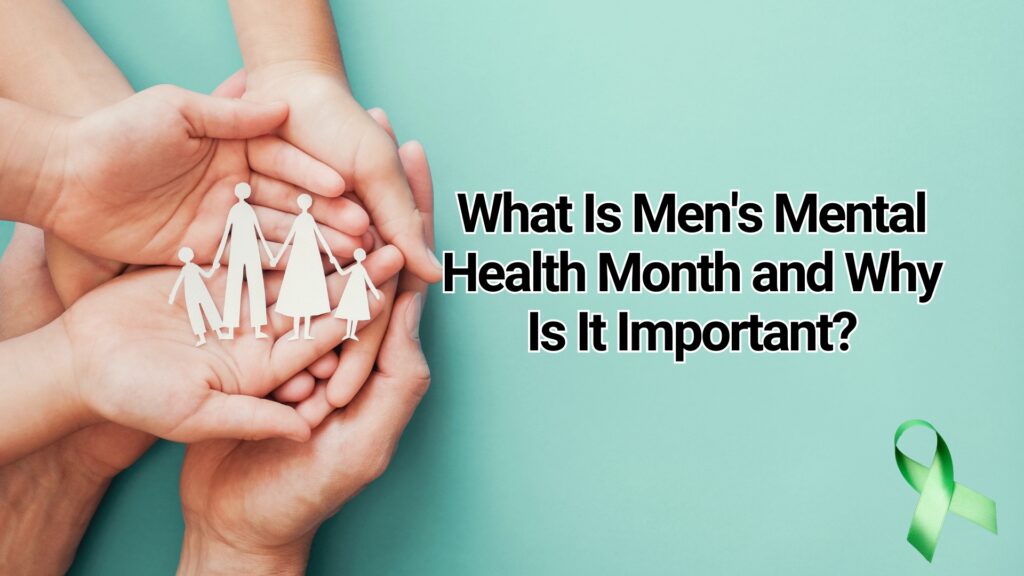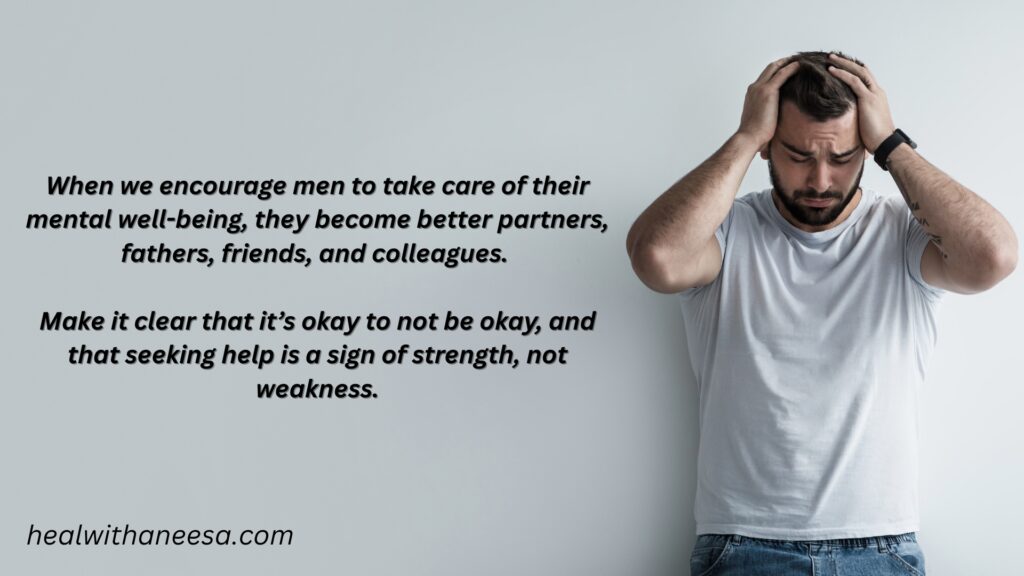Men laugh, succeed, and carry the weight of the world, but inside, they fight invisible battles. It’s easy to say ‘be strong’. The real strength comes from speaking up. Every day, over 6 million men silently battle depression, yet only a fraction seek help. Why? Because we taught them to hide their struggles, which are killing them. That’s why Men’s Mental Health Month matters now more than ever.
Studies shows that men are four times more likely to die by suicide than women. Yet, they are far less likely to seek therapy or open up about emotional pain. It’s not just a “man’s problem”. It’s a crisis that affects families, workplaces, and entire communities.

Men’s Health Month is celebrated every June. This important time highlights a painful truth. Over 800 millions of men are battling depression worldwide. Many still ask, what is men’s mental health month about? The answer is simple but powerful. It’s about changing a culture that tells men to hide their emotions.
Men’s Mental Health Month is marked by green color. It is the official men’s mental health month ribbon color, symbolizing hope, healing, and solidarity. As we approach Men’s Mental Health Month 2025, more organizations, schools, and families are getting involved by hosting workshops, support groups, and mental wellness campaigns.
If you’re wondering when men’s mental health month is celebrated, remember it spans the entire month of June. Through events, conversations, and activities for men’s mental health month, we can help normalize therapy, emotional literacy, and community support for men of all ages.
This guide will explain the reasons for the mental health crisis among men. You will also learn practical ways to support men’s mental health month at home, at work, and in your community. Because the truth is, silence can cost lives, but awareness and action can save them.
The Importance of Men’s Mental Health Month
- Breaking the Silence: Men’s Mental Health Month helps destroy the old belief that “real men don’t talk about feelings.” It gives permission for men to share struggles without fear of judgment.
- Normalizing Mental Health Conversations: This month makes talking about depression, stress, anxiety, and emotional pain feel normal, the same way we talk about physical injuries.
- Saving Lives Through Awareness: Suicide is the seventh leading cause of death among men. Men’s Mental Health Month offers hope by encouraging early intervention and open discussions that could literally save lives.
- Human Healing and Emotional Growth: When men feel safe expressing their emotions, they become better partners, stronger fathers, and healthier individuals. Healing one man often strengthens an entire family and community.
- Workplace and Community Benefits: Companies that support men’s mental health notice lower absenteeism, better morale, and improved team performance. Supporting mental health is good for business and society.
- Physical Health Connection: Ignoring mental health can damage physical health. Chronic stress and hidden emotional struggles can lead to heart disease, diabetes, and high blood pressure. Addressing mental health early helps prevent serious physical illnesses too.
- Building Supportive Traditions: Activities for Men’s Mental Health Month, like fitness events, mental wellness workshops, or storytelling nights, help create positive traditions for men to support each other.
- Personal Advice: Take a moment to reach out to the men in your life. A simple question like “How are you feeling — really?” can open a door that saves a life.
- Redefining Masculinity: Men’s Mental Health Month challenges the old definitions of “manhood” and shows that true strength is found in honesty, vulnerability, and connection.

Common Mental Health Challenges Faced by Men
Understanding these common mental health issues breaks the cycle of silence.
1. Stigma and Reluctance to Seek Help
Men often internalize the belief that seeking help for mental health is a sign of weakness. From a young age, boys are taught to “toughen up,” “man up,” or “handle things on their own.” This conditioning can make it incredibly difficult for men to recognize when they need support.
The National Institutes of Health (NIH) says that men are less likely to reach out for professional help compared to women. This reluctance leads to untreated depression or anxiety.
2. Depression and Anxiety
While both depression and anxiety are common among men, they often manifest in ways that are not immediately recognized. Men are more likely to experience depression with irritability, anger, and aggression rather than sadness.
Take the story of Michael, a 32-year-old father, who spent years bottling up his emotions. He would get angry easily and withdrew from his family, yet his sadness went unnoticed because it was masked by his anger. His depression was only diagnosed when it became so severe that it started affecting his job and relationships.
Men are often more vulnerable to the external, more aggressive symptoms, which include substance abuse, risky behaviors, and violence. Anxiety often accompanies depression, but for men, it can manifest in physical symptoms like headaches, digestive issues, or sleeplessness.
3. Substance Abuse and Addiction
Many men turn to alcohol or drugs as a way to cope with emotional pain or trauma. Unfortunately, this coping mechanism can quickly escalate into addiction, causing both mental and physical damage.
Substance abuse can often mask deeper mental health conditions, further complicating diagnosis and treatment.
4. Suicidal Thoughts and Behaviors
Men are more likely to die by suicide than women, even though women attempt suicide more often. The Centers for Disease Control and Prevention (CDC) reveals that men are nearly 3.5 times more likely to die by suicide than women. Factors contributing to this include untreated depression, lack of emotional expression, and fear of judgment.
5. Workplace Stress and Mental Health
Men often feel the weight of being the provider, or leader in their professional lives. This pressure can lead to stress, and feelings of inadequacy. It’s a common struggle that goes unnoticed because many men are unwilling to show weakness at work.
Job stress is one of the top causes of anxiety and depression in men. High-pressure environments, long work hours, and the constant need to “perform” at high levels contribute to a silent epidemic of workplace stress.
6. Relationship Struggles
Emotional isolation is a big issue for many men. Many men feel disconnected from their partners, friends, and family. This emotional distance can strain relationships and prevent men from seeking necessary support.
Over time, this emotional distance led to tension in their relations. Mental therapy is most important at this time to encourage them to be better in their relationship.
Final Thoughts
Men’s Mental Health Month is a call to action that we must carry with us every single day. This month serves as a powerful reminder that we must change how we view and support men’s mental health. It’s not enough to recognize the struggles of men in June alone. We need to show up for them all year round.
Supporting the men in your life begins with listening. Don’t wait for a crisis to ask, “How are you really feeling?” It’s those simple, sincere conversations that can make a world of difference.
When men feel safe to express themselves without judgment, they are more likely to seek the help they need. Sometimes, offering a non-judgmental space to talk can break the silence and start the healing process.
Incorporating mental health support into your daily life for men to be vulnerable, is crucial. Make it clear that it’s okay to not be okay, and that seeking help is a sign of strength, not weakness.
From the workplace to families, supporting men’s mental health creates stronger, more resilient communities. When we encourage men to take care of their mental well-being, they become better partners, fathers, friends, and colleagues.
Reach out, check in, and let the men around you know they are not alone.

This is my first blog on my new website, and dedicated to all great men in my life:) Thank you for always being with me!!!!!!!!!!!!!!
Pingback: What are the 7 Habits to Avoid Dementia? - Heal With Aneesa
Pingback: How to Tell if Shortness of Breath is From Anxiety - Heal With Aneesa